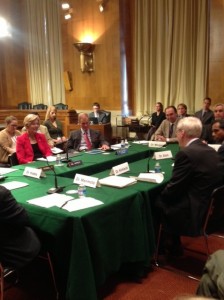-
Roundtable on Tackling Diseases of Aging: Why Research Collaboration Matters
James Kirkland, M.D., Ph.D., Director, Robert and Arlene Kogod Center on Aging, is testifying before the Senate Special Committee on Aging today at 4 pm ET. WATCH LIVE
Below are some excerpts from Dr. Kirkland's scheduled testimony:
"I am a clinical geriatrician who sees patients, as well as a basic laboratory scientist. I am investigating ways to delay chronic diseases and disabilities by designing interventions that target the fundamental aging mechanisms that predispose us to these diseases.
"Age-related chronic diseases account for most of the morbidity, mortality and health expenditures borne by the people of the United States. Exciting, recent advances in our field are beginning to suggest that, by intervening in fundamental aging processes, we may one day be able to prevent, delay and cure multiple age-related conditions, including cancers, dementias, heart attacks, strokes, vascular disease, diabetes, kidney disease, arthritis, blindness, frailty and loss of independence, as a group, instead of one at a time."
Among the work that needs to be done soon is:
• Discovery and development of even more potential interventions, so we can maintain a pipeline of emerging treatments
• Testing effects of each potential intervention in multiple age-appropriate animal models of age-related chronic diseases, as well as in normal animals just with advanced chronological aging
• Testing across a range of species before we move to human studies
• Understanding and minimizing potential complications
• Testing of combinations of treatments in experimental animals to optimize outcomes and minimize side effects
• Conducting initial, small proof-of-principle trials in human subjects, and eventually full clinical trials.
Obviously, we cannot study the impact of such interventions on lifespan in humans. Also, successful interventions will need to be effective in older or at-risk subjects. Drugs that have to be given in early life to have a late-life effect will be difficult to study in humans.
"In the spirit of fostering collaboration and preventing disruptive competition, the Mayo Clinic Center on Aging has initiated and will lead the implementation of a Geroscience Network that involves 10 other leading aging centers across the nation. This network recently received financial support from the National Institute on Aging (NIA). The goal of the Geroscience Network is to enhance healthspan by coordinating areas of focus among aging centers; minimize duplication of effort; develop joint research protocols, curricula, clinical trials subject populations and clinical trials networks; and support faculty and student exchanges among centers.
"In summary, the aging field is at an exciting juncture, with recent discoveries of interventions that hold potential for increasing healthspan and lifespan and combating major age-related chronic diseases as a group, instead of one at a time. While by no means fully certain, it appears increasingly likely that some of these interventions may soon be ready to be tested in clinical trials. There is enough promise now that a major initiative to accelerate this work is warranted.
"More could be done, and hopefully will be, as these steps are taken and increased funding allows us to move faster in this area. We are optimistic that support might increase as the potential benefits of targeting age-related diseases as a group and enhancing healthspan are recognized by the public, governments, donors, industry, and our colleagues across scientific and clinical disciplines. Since the first wave of baby boomers started turning 65 in 2011 and 11,000 people per day will continue to reach this milestone until 2030, the potential gains for society with this approach are substantial, possibly even transformative."









